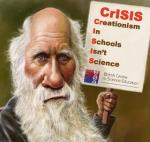
"Free school bids from groups advocating creationism and intelligent design as scientific theories will not be approved, according to the first government guidance on the issue," reports the Times Education Supplement (May 20, 2011). The guidelines by which applications to establish free schools are assessed provide, "Creationism, intelligent design and similar ideas must not be taught as valid scientific theories," and a spokesperson for the Department for Children, Education, and Schools told The Telegraph (May 20, 2011) that the Secretary of Education, Michael Gove, "will not accept any academy or free school proposal which plans to teach creationism in the science curriculum or as an alternative to accepted scientific theories."
Like charter schools in the United States, "free schools" are established by local groups of parents, teachers, businesses, colleges and universities, and/or non-profit organizations, but funded directly by the government. Allowing free schools was a key point of the Conservative Party's education platform in the 2010 British election. After the present coalition government took office, free schools "were given approval in the Academies Act 2010, which paved the way for existing state primary and secondary schools to become academies," according to the BBC (May 23, 2011). As of May 2011, the Department for Children, Education, and Schools had received 323 proposals from groups wanting to establish a free school; between ten and twenty are expected to open by September 2011.
The guidelines were issued just a week after a new campaign — Creationism In Schools Isn't Science, or CrISIS — petitioned the government to enforce its stated position on the teaching of creationism. "Creationism is known, and officially acknowledged, to be contrary to scientific fact," the petition argued. "We therefore demand that creationism should not be presented as a valid scientific position, nor creationist websites and resources be promoted, in publicly funded schools or in any youth activities run on publicly funded school premises." Endorsed by the National Secular Society, the religious thinktank Ekklesia, and the British Centre for Science Education, CrISIS was started by a concerned parent, Laura Horner, after a young-earth creationist was invited to speak at her son's school in Exeter.
"The guidance is wonderful news and shows the Government taking a step in the right direction," Horner told the Times Education Supplement. "We now expect the ban to be extended to apply to any activity taking place in school." (The new guidelines concern only free schools; in the Exeter case, the creationist speaker was allowed to present his views as scientifically credible in a religious education class in a state school. Since creationism is often discussed in religious education, such classes offer a possible venue for creationism to be improperly presented as scientifically credible.) Roger Stanyard of the British Centre for Science Education told The Telegraph (May 20, 2011) that his organization was "largely happy" with the guidelines, but warned, "It depends how it is implemented. People will always find ways around the rules."
